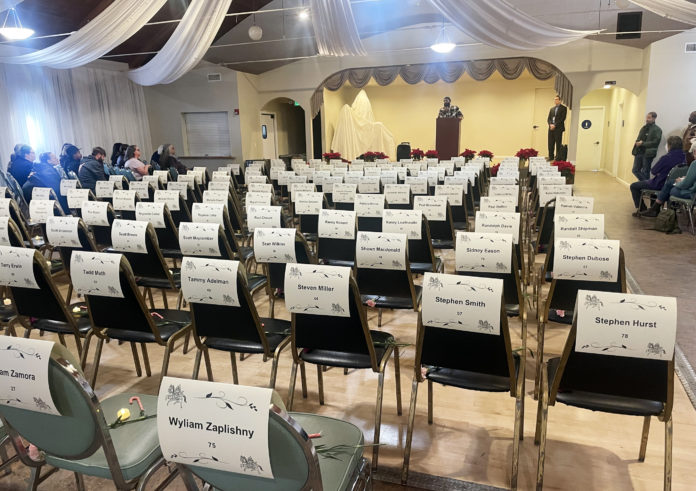
The number of people who died while homeless this year saw a sizable decline from last year, when Santa Cruz County honored 121 people at its annual Homeless Memorial.
Still, the 75 chairs at the center of the cavernous Portuguese Hall in Santa Cruz—each empty except for a small electronic candle, a candy cane and a name placard for each of the homeless people who died while homeless—were a stark reminder that the work is not over.
Often, the annual memorial—this was the 26th year the county has held the event—is the only ceremony the people receive.
It usually takes place near the winter solstice—the darkest day of the year—but also the turning point when sunlight starts to gradually return, said Santa Cruz County Homeless Services Director Robert Ratner.
Ratner said his journey to his position began in the 90s when he volunteered at a homeless shelter and heard the stories of the people there.
“Really listening to people changed my life,” he said.
Around that time, the concept of homelessness entered the public consciousness, which was both a curse and a blessing.
“People without shelter became ‘the homeless,’ instead of Ike, Jill, Tony…people with names, stories, hopes and dreams,” Ratner said.
“In their stories there are answers for all of us.”
What unhoused people really need, he said, is “more options that people can afford.”
“Where they can be welcomed and supported for who they are today and who they want to become tomorrow,” Ratner said. “Options with high hopes and expectations, healthy and safe environments, and community.”
The end of the annual ceremony is a chance for anyone to talk about the people they lost, and what they remember about them.
Chris Brown, who described himself as a recovering addict and an unhoused person who has been housed for about a decade, said many of the people who died helped him when he was living on the streets.
“There are names in these seats that taught me how to survive on cold nights,” he said. “There are names in these seats that I spent Christmas with, spent Thanksgiving with, spent every holiday of the year with.”
“Most importantly they taught me how to survive,” he said. “Not one day goes by in this setting that I don’t think that if I would have continued down the road that I was on, that my name would be on one of those seats.”









Thank you Todd